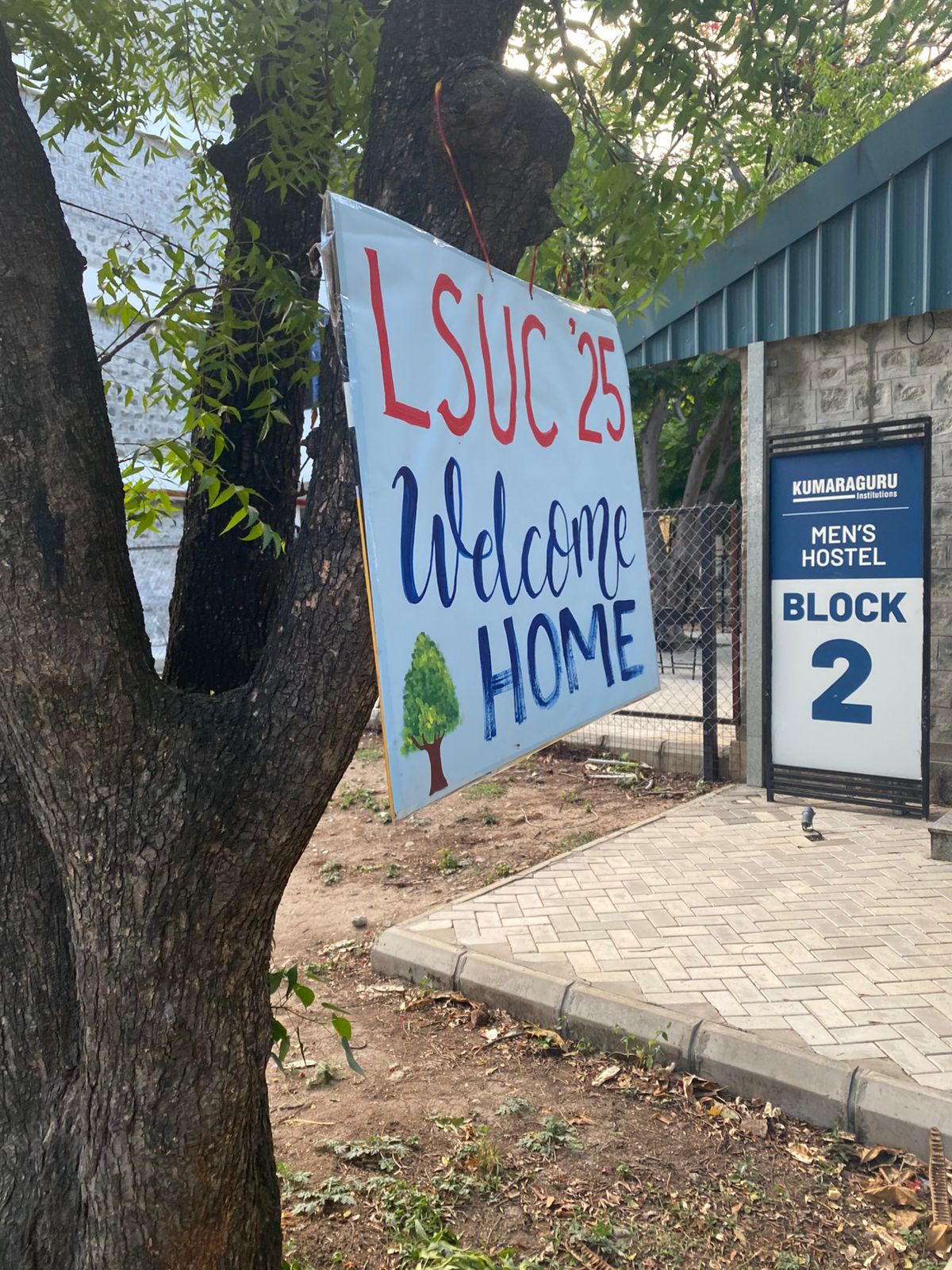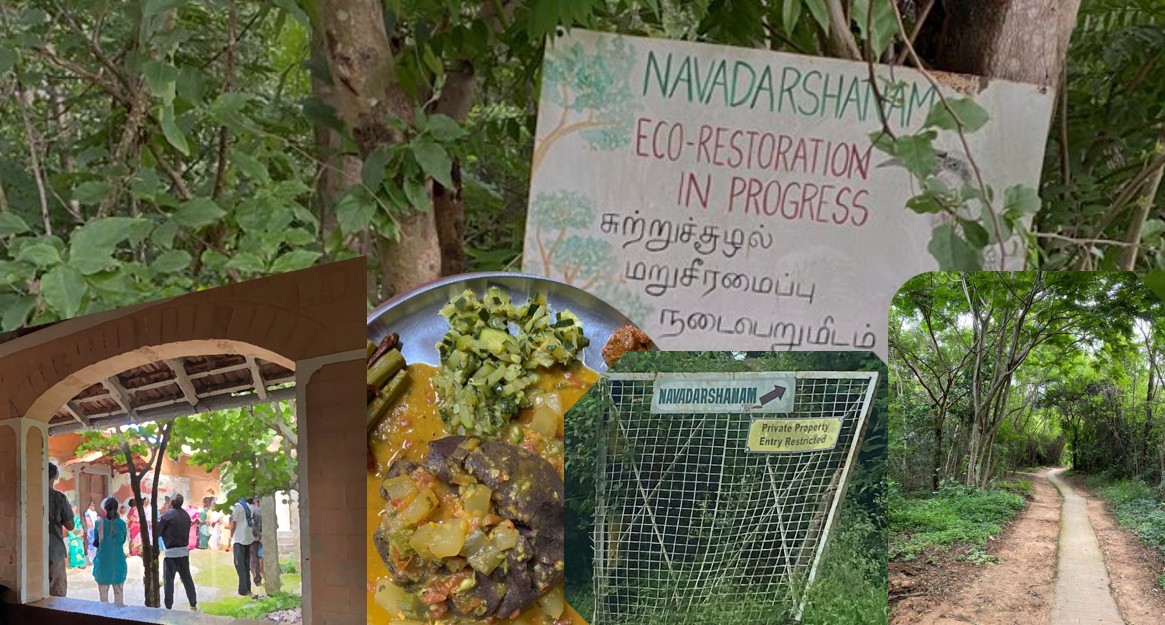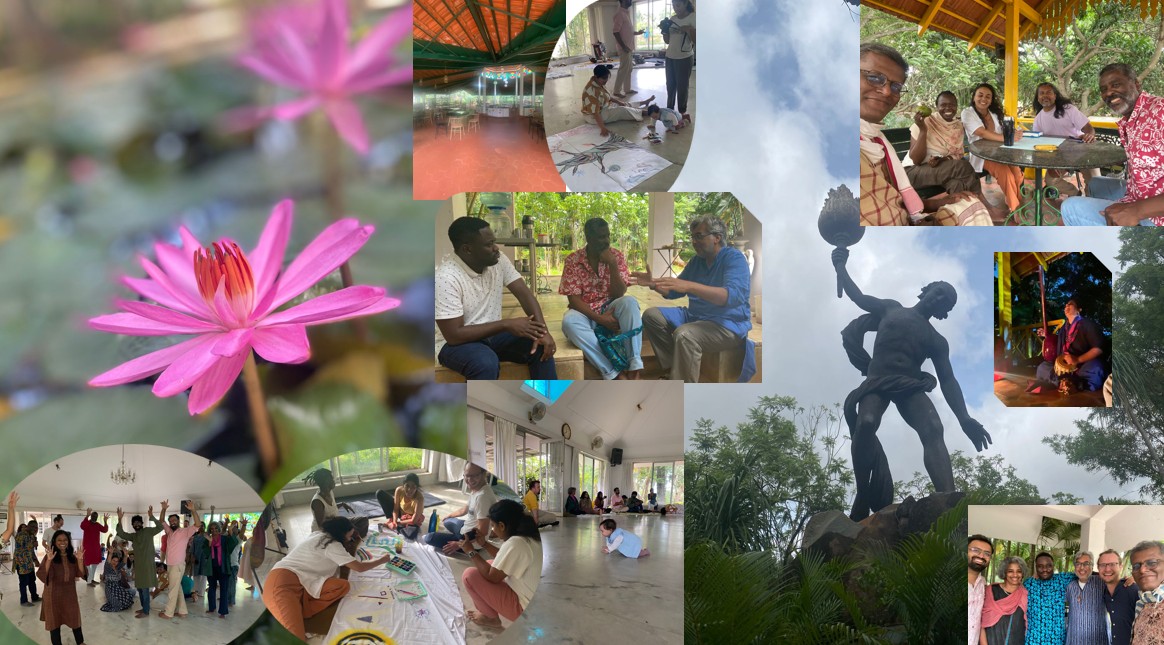Academia modelled by the 15th century European imagination is dying or dead already. Along with it the academic conferences as well. A new emergence is happening, and it is coming from the margins, civil society, and collaboration among some courageous academics as well. It is coming from the old civilizations - Africa, South America and India as well. I attended three such events in the last month, I prefer to call them not as ‘’conference’’ as much as ‘’gathering’’ of consenting people to be in a gathering. The stewards of these new emergences are inspired and energized by the previous generation of anti-Colonial writers, resistance movements and academic activism. But it goes beyond mere native / reactive scholarship, they are integrating arts, music, dance, meditation, yoga, silence, honouring elders, rituals, and joint reflections into their new imagination. From the myriad ways of learning and knowing that surfaces from the civilizational memory as the transient paint of western knowledge processes withers away with winds of time. Ways of learning that the dead university system had deemed unfit in the stratified exclusive echelons of knowledge pursuit.
Learning Society UnConference (LSUC)
 Late last month I attended the “UnConference” of the Learning Society in Coimbatore. Organized by the Swaraj University and Indian Multiversity Alliance, more than 800 parents and students congregated for this event to celebrate diverse ways of learning. I have written about the experience in a blog already (link). Families, small learning communities, group of friends in diverse fields concerned about their children’s education, teachers, concerned grandparents, and students all freely mixed and mingled for 5 days to discuss and pursue learning in ways and methods that has not been fully explored until now. That the pursuit of knowledge can
Late last month I attended the “UnConference” of the Learning Society in Coimbatore. Organized by the Swaraj University and Indian Multiversity Alliance, more than 800 parents and students congregated for this event to celebrate diverse ways of learning. I have written about the experience in a blog already (link). Families, small learning communities, group of friends in diverse fields concerned about their children’s education, teachers, concerned grandparents, and students all freely mixed and mingled for 5 days to discuss and pursue learning in ways and methods that has not been fully explored until now. That the pursuit of knowledge can
- start from a farm or forest,
- that it can be facilitated not merely by a monolithic structure of a college or university,
- that such people can build their own networks for not merely to facilitate free learning process, but, also help evolve new careers for students was the message of this gathering for me.
It was ironically hosted by a mainstream college where the dazed students in their pursuit of ‘serious’ academic work, looked in envy at the home schoolers, self-learners, diverse learners, wondering why they were being denied the same. I spoke to a group of such students who acknowledged at the end that this was the first time they were with someone ‘talking’ to them when they didn’t look at their phones out of boredom for over an hour! “Sir, can you give a master class to our professors?”, one of them exclaimed!!
Campaign Narrative Strategy gathering
 The second gathering I want to talk about was something I attended early this month called by a group of activists. It was to devise strategies for building a narrative that was against the mainstream narrative of a certain industrial development (can’t go into details on this yet). I neither knew the industry much nor the complexities of issues involved in it and was a bit piqued by the invitation to participate in the gathering for 2 days. I liked the fact that activists actually sit together for couple of days to devise strategies on building narratives – this many don’t think of, most cannot afford to. The gathering was of people from diverse backgrounds – scientist, policy maker, activist, consultants - cutting across diverse ages and sat together to evolve the critical aspects that need to be built into such strategies. The organizers emphasized that the reason for the diversity of the gathering was to gain new perspectives and gain a strategic multiplier effect for their campaign.
The second gathering I want to talk about was something I attended early this month called by a group of activists. It was to devise strategies for building a narrative that was against the mainstream narrative of a certain industrial development (can’t go into details on this yet). I neither knew the industry much nor the complexities of issues involved in it and was a bit piqued by the invitation to participate in the gathering for 2 days. I liked the fact that activists actually sit together for couple of days to devise strategies on building narratives – this many don’t think of, most cannot afford to. The gathering was of people from diverse backgrounds – scientist, policy maker, activist, consultants - cutting across diverse ages and sat together to evolve the critical aspects that need to be built into such strategies. The organizers emphasized that the reason for the diversity of the gathering was to gain new perspectives and gain a strategic multiplier effect for their campaign.
The event itself was hosted in a forest bordering large organic farm called Navadarshanam in the Tamil Nadu - Karnataka border, with a small intentional community. Dining with the community members on a vegan meal, walking with them to understand the challenges of farming in a human – animal conflict zone, participating in the morning prayers and evening bhajans of the community, were all part of the gathering as much as the deliberations.
Naduve

I am writing this note while returning from another important gathering of ‘’scholar-activists’’ that gathered as ‘’naduve’’ (in between in Kannada) space. A gathering that is conceptualized from a de-colonial space, where music, dance, silence, joint reflection and honouring ancestors’ rituals interspersed with some of the most powerful articulation of the post-development, post-colonial, anti-corporate hegemonic movements I have heard in recent years. It had scholars, career academics, policy makers, consultants, artists, dancers, singers, and several young people in exploratory and transition space, combining as equals in a space to share stories, laugh and cry together, to dance, hug and hold each other, honouring the nature around in silence sometimes, erupting in spontaneous song in other times. It was an experience like no other I have ever seen in my career.
The presence of the African scholars, thinkers, activists and artists especially was enriching and elevating. The dignity of their sharing struggles of ethnocide and silent genocides, sorrows and protest movements, hopes and apprehensions, engulfs one with an emotional rollercoaster of uncertainty and expectation at the same time. “We can create something because we are here together, this space and this moment is beautiful and if we are here and we are experiencing it together, we can take it elsewhere, this beauty can spread and it can perhaps change this monster system”, is not articulated as much as implied. The emphasis always on the beauty of the moment. In their emphasis of the arts and music, I was reminded of the encounter with the South American shamans and healers, their emphasis of bringing their spiritual culture to the negotiation table first as part of their identity has enriched the world, so, will the African emphasis on rituals, arts, music and dance. The Indian ethical legacy has something to learn from these in becoming assertive with the current markets and systems. Underselling our ethical conduct to the governments, markets and glamour is not merely costing us, but also the planet.
Can we acknowledge that there are cracks in the system, that it is unravelling, that we are witness to the same even if helplessly so, can we share the grief, the small joys, can we cherish the momentary beauty, acknowledge the “misbehaving” plants, and just be available to each other? Was the question that repeatedly came up through the 3 days of intense sharing. Not the typical ‘’outcome’’ and ‘’output’’ oriented events that are shaped by the salaried class to generate profits for their far away masters. Nor the vanity gatherings of disapproving scholarly shenanigans, deep seated in their arrogance. But, a gentle offering of togetherness, to stay vulnerable, to preserve, and be present. The honesty and spontaneity celebrating what the highest humans can achieve and what the AI and machines can never ever copy or replicate.
Interestingly this event was held in a spiritual retreat centre in a greenery surrounding simple space with simple accommodation and vegetarian food of a local cuisine and surrounded by water bodies, birds, insects, bugs and cats.
Winds of Change
All the three events had people interacting with each other in the open, all the events had people sitting on the floor, all of them sat in circles, none of them had any opulent five star standardized unhealthy meals, all the events gave space for spontaneous emergence. Except the one to build a campaign the other two did not even have a specific outcome to achieve either. There is an acknowledgement of sanctity either as a ritual, an altar gathered, a prayer offered together, joint meditation, singing and or a shared reflective space. There is also a space for self-care – the learning society gathering had people giving free massage through the day and the night, the yoga sessions ran parallel to healing sessions, the naduve gathering had prana breathing exercises, joint walking and jogging in the morning apart from several one-to-one counselling and healing sessions, even the gathering on campaign had an optional yoga session for the participants.
I contrast this in my mind with the dead academic programmes I have attended in recent months as well (my earlier summary of these)– airconditioned halls with raised podium for speakers, protocols of seniority, and discrimination that go with ‘’recognized’’ scholars either on demand or as a habit, frequent interruptions to accommodate powerful and mighty, the inanity of unending false platitudes to every speaker that neither comes from a space of understanding their worth nor from any genuine gratitude; the useless memento presenting that is elevated into a ritual by the commodity market, the non-stop talking by successive speakers that interests none and often does not add up to anything more than wasted space and time while the planet burns; the opulence, decoration, colourful digital posters and invitations, the heaviness of papers printed and handed to all only to be discarded into ever increasing landfills; the great detailing of buying and distributing pens, notebooks, folders and bags to satisfy an accountant’s ledger, the stupidity of organizing all this to win a brownie point in an corrupt academic rating system, a herd walking into self-destructive oblivion. These conferences are the death of the intelligence in academia. This is what we witness in majority of colleges and universities today.
This pathway of a long forgettable western system of learning and knowledge pursuit is not forced on us by any external power, but by our own incompetence and lack of imagination. But if they can learn from the civil society, from the likes of the naduve organizers or the LSUC, the swaraj community - then there is hope for them to stay relevant to the coming generations. Some of them are learning and slowly changing, so, I guess there is a hope, though faint.
A friend has responded to me stating that these gathering I have profiled seem to be far and few between and mostly 'elite'. I agree that there are few, but disagree that these are elite. Elite gatherings are held in 5-star hotels and tech-incubation cells, where fast paced presentations with high sounding speakers, repeating themselves in endless-loop compete to hold attention with unhealthy food induced drowsiness. Where mediocre projects with 20% accomplishments are designed, paraded and claimed as accomplishments by young and ambitious. Where theories of change and business plans of success, are written by consultants on hourly hire who neither know the location nor the domain of intervention, impact indicators are outsourced to 'third party' but their payments controlled by the very project they are measuring impact of, claims of success and impact is exaggerated to suit the ego of the documenter or that of the donor and every attempt to correct or request for clarification can result in rebuke or ridicule.
Add new comment